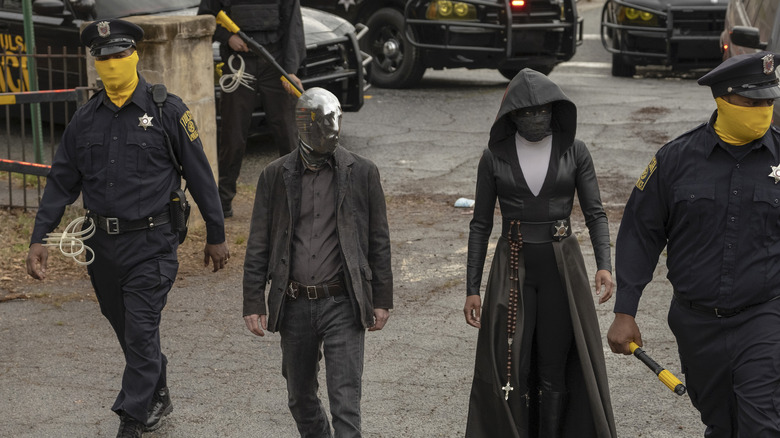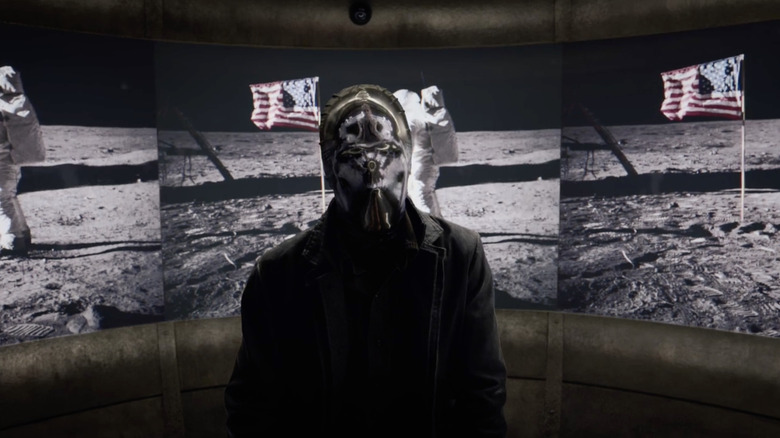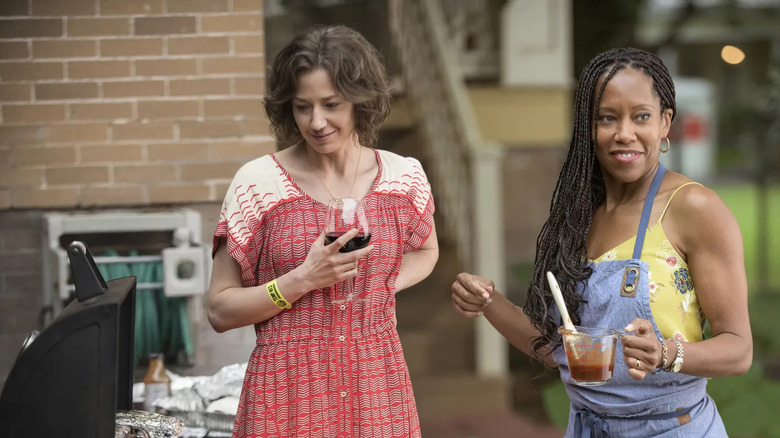Why Damon Lindelof Waited So Long To Write His Watchmen Series
Damon Lindelof's HBO miniseries "Watchmen" is one of the best superhero shows to ever air, and a worthy successor to Alan Moore and Dave Gibbons' original comic series. The show was clearly written by people who had a ton of respect for the source material, and who weren't afraid to be as bold and innovative as the original creators were in the '80s. It wasn't Lindelof's first opportunity to bring "Watchmen" onto the big screen, however. The first two times it was offered to him, he turned it down:
"I said no for various reasons. First and foremost, the timing didn't feel right — [director Zack Snyder] had just made his [Watchmen] movie. And secondly, revisiting the source material meant adapting something that I knew was so perfect. I knew the best job I could do adapting the original Watchmen was just being a really good cover band."
It's an interesting point, especially considering that so many of the most beloved movies of all time — "Forest Gump," "Children of Men," "The Shining" — were stark departures from their source material. Those movies may have disappointed many of the fans of the source material, but ultimately they were successful because they had a life of their own. The directors and screenwriters of those films didn't see the point in simply repeating a story we've already read but for a different medium; they wanted to put their own spin on it, and their willingness to take that risk paid off big time.
So it makes sense that when Lindelof did take his chance to bring a "Watchmen" story to the big screen, it wasn't a straightforward adaptation of the comic, but a sequel that explored what the world of the comic would look like 30 years later.
The Watchmen remix
The 2019 "Watchmen" series had a much higher barrier to entry than most TV shows, as it was basically a sequel to a comic that was never truly adapted to the big screen. The series didn't follow along with the events of Zack Snyder's 2009 "Watchmen," which made a major change to the source material by having New York City destroyed in a way that implicated Doctor Manhattan, not via a giant fake alien squid. If you only watched the movie, the first few episodes would likely be very confusing because of this. Although the mini-series technically still stands on its own if you haven't read the source material, you should still read it if you want the full experience.
"Is there a way to take this thing I love and be inspired by it, not erase it, but build upon its foundation?" Lindelof said about his thought process, and that's exactly what he did. He created a miniseries that faithfully followed up on the main character's lives, as well as followed the original's commentary on contemporary issues. (Whereas Moore was focused primarily on the cold war, Lindelof focused on the racial tensions of 2019 America.) He said: "The ideas started to come with what to do with 'Watchmen' and then it didn't really feel like a decision anymore but something I felt compelled to do."
It's all a very unconventional way of going about the source material. The safer option, the one most networks would've gone with, would've been to spend the first season adapting the graphic novel and then wait to tell this story in season 2. Thankfully, HBO's never been shy about letting their showrunners go in the direction they want.
Lessons from The Leftovers
Lindelof himself admitted his reasoning behind this creative choice "sounds arrogant and full of hubris," but his long career in TV and film taught him to follow through on his instincts anyway:
"When I haven't made choices based on that feeling things haven't turned out so well because then you're doing it for the wrong reasons. But when you get really inspired you have to chase it even if it leads to ruin."
One other benefit of Lindelof waiting as long as he did was that he got to really hone his skills with "The Leftovers," a show whose final two seasons went beyond its source material. After season 1 finished up Tom Perrotta's novel, Lindelof continued to explore the characters and the world the book introduced, creating something that was more critically revered than the debut season's straightforward adaptation.
"The Leftovers" also structured itself in a similar way. The two standout episodes of its first season were the ones that focused entirely on one character's perspective. Lindelof and his writer's room clearly took notice of the positive reception, as seasons 2 and 3 structured the majority of its episodes that way. It was Lindelof's experience with this structure that led to the most impressive "Watchmen" episodes: Laurie, Looking Glass, Doctor Manhattan and Hooded Justice all got their own special episodes, each of them making up the clear highlights of the series.
It may have been tough for Lindelof, a fan of "Watchmen" since he was 13 years old, to wait as long as he did for this project. But considering the results, we're glad he did.


